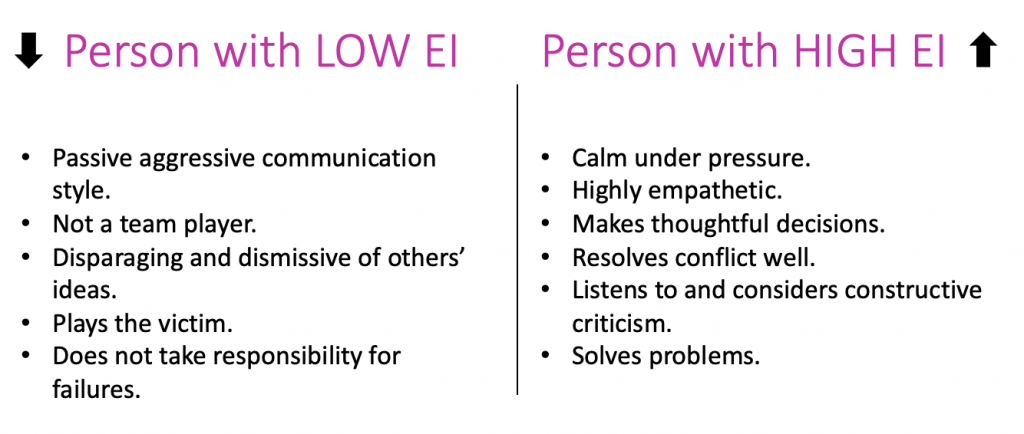Have you ever let your emotions run wild in the workplace? Instead of pausing to think about how your emotions could affect an outcome have you lost your temper, laughed inappropriately, or rolled your eyes at an idea you did not agree with?
If you have you are not alone. As humans we can all find ourselves being reactive with our emotions and this is especially true in the business world, which can lead to negative outcomes such as tension amongst team members or failing productivity.
The good news is that there is much that we can do to help ourselves overcome these spontaneous emotions. We can in fact train ourselves to become emotionally intelligent which has been proven to be beneficial not only within an organisation but on personal levels as well.
What is emotional intelligence? Emotional Intelligence (EI), also referred to as Emotional Quotient (EQ) is the ability to recognise and identify not only your own emotions, but also the emotions of those around you. The key then is to control our emotions. Studies have shown that having a higher level of emotional intelligence, particularly in the workplace, is critical in today’s business world. EI is strongly linked to success, productivity, and overall good mental health. While EI will be valuable to all employees, it is key to the success to those of us in leadership or management roles.

Psychologist Daniel Goleman, author of 1995’s breakthrough book, ‘Emotional Intelligence’ said, “By teaching people to tune in to their emotions with intelligence and to expand their circles of caring, we can transform organizations from the inside out and make a positive difference in our world.”
In his book, Goleman defined these 5 Characteristics of EI:
- Empathy – how we can put ourselves in the shoes of others to understand their situations
- Social Skills – being able to communicate with others with efficiency and effectiveness
- Self-Awareness – being able to recognise and understand our own emotions as well as the source
- Self-Regulation – taking a breath to think about why we feel an emotion, and more importantly the ability to evaluate and address our emotions
- Motivation – how we can regulate our feelings to produce positive outcomes, hence becoming more motivated for even more favourable results

There are several things we can do to start to improve our own emotional intelligence so that we can also understand the emotions of our colleagues to enrich the workplace environment and be successful.
A good place to start is by being honest and open. If we are real about our own feelings, it will encourage others to do the same.
Next, learn to read the emotions of others. Sometimes we can display a different emotion to mask what we really feel. For instance, someone with an out-of-character explosive temper may in fact be grieving or struggling with some other kind of stress. It is important to read non-verbal cues such as gestures or tone-of-voice to really understand how someone else may be feeling.
Another thing to help boost out EI is to become more self-aware. By taking stock of our own strengths and weaknesses, we can learn to navigate our own feelings and appropriately gauge our own responses to conflicts and other potentially stressful affairs. This can also help to diffuse harmful workplace situations.

In summary, if we can all learn to become more emotionally intelligent, we will promote positive interactions with colleagues and customers, increase our career prospects, develop effective teams and generally create solid, positive connections within our organisations.
Not to mention, high EI has a proven track record of generally increasing good mental health and can be applied not only at the office but also at home and in other personal circumstances.
👀 Look out for a future post on Positive Intelligence with a link to take a simple self-assessment to review how your own thoughts and actions could be sabotaging your success.

